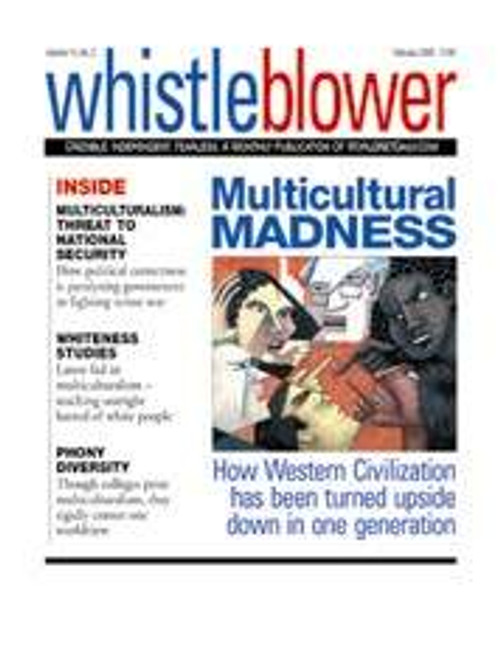You can view the print version here.
FOOD FRAUD: Why government and 'experts' have fed you dangerous dietary advice for decades
Salt is bad. Sugar is bad. Carbs are bad. Cholesterol is bad. Calories are bad. Fat is bad.
Bad also are the whole, natural foods that sustained our ancestors during an era relatively free of the modern plagues of cancer and heart disease—foods like eggs, raw milk, butter, cheese and red meat.
So what's "good" for us? Soy-burgers and tofu, margarine and non-dairy creamer, canola and corn oil, synthetic egg substitutes and "low-fat" dessert toppings—in fact, everything labeled "low-fat."
Something is rotten in America's food bureaucracy. Indeed, as documented in February's stunningly eye-opening Whistleblower magazine, "FOOD FRAUD," Americans have been seriously deceived about food and what constitutes a "healthy diet" for a very long time.
"This issue of Whistleblower tells the amazing and sometimes shocking story of how the food establishment—including the food industry and its marketers, major 'health' organizations, government and even the medical bureaucracy—has pushed profoundly misguided advice and questionable theories on the American public regarding which foods are healthful and which are not," said WND managing editor David Kupelian.
Fortunately, he added, "once you've understood how these powerful modern food myths came into being, and how new research is disproving them, you may well notice your common sense rising up and shouting, 'Yes, I've always thought that!'"
Highlights of "FOOD FRAUD" include:
- "The food mythbusters" by David Kupelian, on exposing food deceptions that have endured since the 1950s
- "You are what you eat?" by Joseph Farah, on the sometimes-horrendous consequences of importing food from China and other far-off lands
- "Government: You have no right to choose your own food" by Bob Unruh, on how government regulations and court decisions literally bar families from drinking milk from their own cows—and prosecute them for doing so
- "Chuck Norris warns: 'Don't eat that $#!+@*&%'"—in which the martial-arts and fitness icon lays out the proven dangers of genetically modified foods
- "The worldÌÎÌ_ÌÎ_ÌÎÌ__ÌÎÌ_ÌÎ__ÌÎÌ_ÌÎ_ÌÎå«Ì´ÌàÌÎÌ_Ì´åÇÌÎå«ÌÎÌÊs healthiest people" by Jordan S. Rubin, N.M.D., Ph.D., in which the author of "The Maker's Diet" shows how science and the Bible converge to illuminate the diet the Creator intended
- "New research: More fast food equals more obesity"
- "Rise of the junk food black market"—how a Los Angeles school district's switch to "healthy fare" has sparked widespread revolt among students and a thriving underground market in forbidden foods
- "Farming by the 'Creator's design'" by Art Moore, which showcases, in an age of giant agribusinesses, a growing movement in the opposite direction
- "The oiling of America" by Mary G. Enig, Ph.D., and Sally Fallon, the incredible true story of how nutritious whole foods have been demonized in America, while unhealthful, synthetic foods have been promoted and enshrined
- "Scientists: Saturated fats not really so bad after all"—showing how, after decades of dire warnings, researchers now say meat, milk, cheese and butter are OK to eat
- "Surprise: Why coconut oil is good for you—a quick biochemistry lesson"
- "Why raw foods are important—the magic of enzymes" by Sally Fallon and Mary Enig
- "Top 10 reasons to buy U.S. local organics" by Chuck Norris
"We have become so confused about food in this modern, supposedly enlightened age," said Kupelian. "But the plain truth is that many peoples of the earth have somehow eaten right, long before the aid of modern science. Before we knew about vitamins and minerals, or understood the importance of enzymes and phytochemicals, before we knew much about human physiology and digestion and disease pathology or even recognized the existence of germs—many cultures nevertheless managed to embrace perfectly sensible and health-promoting diets. They knew something.
"This issue of Whistleblower explores that 'something,'" he said.
For a 12-month subscription to Whistleblower, click here.







